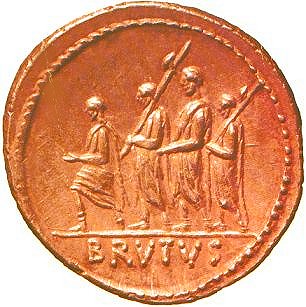Cursus honorum - Livius (original) (raw)
Cursus honorum: the "sequence of offices" in the career of a Roman politician.

A Roman magistrate and two lictors carrying fasces
In the late sixth century BCE, Rome became a republic and was, by definition, ruled by magistrates. The most important of these were the consuls and the praetors; the aediles and the quaestors occupied occupied positions of lesser importance.
After their period in office, the magistrates became member of the Senate. During the centuries, new magistracies were added, but the tasks of the four main magistracies remained more or less the same. This changed in the first century BCE, when the Roman state was first ruled by military commanders (e.g., Sulla, Pompey the Great, Julius Caesar), and later by an emperor. Then, the old functions became prestigious but meaningless sinecures.
The senatorial magistracies of the Roman republic and empire can be divided into four main groups:
- Ordinary senatorial magistracies (quaestor, aedile, praetor, consul)
- Extraordinary senatorial magistracies (dictator, censor, pontifex maximus)
- Promagistracies (proconsul, propraetor)
- Other magistracies (tribune, prefect)
From the third century BCE on, senatorial careers followed more or less the same track. After military service, one became quaestor, aedile, praetor and finally reached the consulship. Minimum ages were laid down in the Lex Villia annalis (180). This typical career was called the cursus honorum, the 'sequence of offices'. When one was elected consul, he had already shown what kind of man he was in several branches of government activity (the army, accounting, care for the temples and Games, justice); in other words, the Roman magistrates were not specialists but generalists. The career in the last two centuries of the Roman republic can be summarized as follows.
During the empire, new functions were created. One of the prerogatives of the emperor was to reward talented men with a dispensation for the minimum age. This was a sign of imperial favor.
So far the senatorial magistracies. There were functions for the equestrian order as well. (This was the "second level" of the Roman elite.) The most important function in this career was that of procurator, prefect and the praetorian prefect.